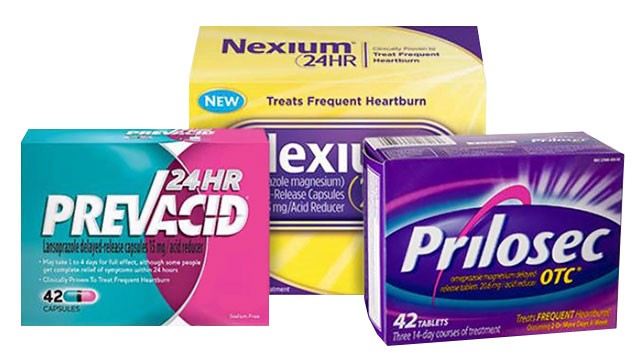
While proton pump inhibitors such as Nexium, Prilosec, and Prevacid can provide relief for those suffering from acid reflux disease, there are potential health risks that you need to know about.
There are several proton pump inhibitors available for purchase, but the most-common one available without a prescription is omeprazole, commonly known as Prilosec®. Some of the other PPI medications available include esomeprazole (Nexium®), lansoprazole (Prevacid®), rabeprazole (AcipHex®), pantoprazole (Protonix®), and Dexlansoprazole (Kapidex®).
Doctor’s most-commonly prescribe a PPI medication to treat acid reflux disease. In most cases, the patient takes the medication 30 minutes before the initial meal of the day. Some people who suffer from acid reflux must take proton pump inhibitors daily while others only need them every other day.
People who suffer from ulcers may take proton pump inhibitors for eight weeks along with other medications. Patients should take PPIs at the same time every day and continue taking them as long as the doctor believes it is necessary.
Negative Effects of PPIs
Rebound acid hypersecretion is believed to be caused by the body’s reaction to proton pump inhibitors. These medications work by preventing the enzymes that produce acid from functioning, which ultimately decreases how much acid the stomach secretes. The stomach’s reaction to this reduced acid is to work harder in order to create more acid.
While PPI medications are intended to reduce this effect, once the medication is discontinued, the stomach continues producing quantities of acid in excess of what is needed; this leads to additional bouts of acid reflux. For most patients, the effects of PPI-related rebound subside completely after several weeks and usually last a maximum of three months.
H2 blockers and antacids are other medications used to treat acid reflux. Unlike PPIs, these medications have minimal side effects and do not usually cause the condition to worsen. In spite of these facts, doctors do not recommend extended use. Occasionally, the use of antacids like Gaviscon® can even cause gastrointestinal obstruction that can worsen acid reflux.
There is a downside to the elimination of stomach acid — it contributes to the absorption of some of the vitamins and minerals that are necessary for eliminating harmful bacteria.
The drugs already carry warnings for several known risks, including:
- Recurrent Clostridium difficile infections that can cause chronic diarrhea, pneumonia, and low magnesium levels. The latter can lead to muscle spasms, heart palpitations and convulsions, as well as fractures of the spine, hip, or wrist.
- May reduce the effectiveness of Plavix®, a drug prescribed for the prevention of blood clots.
Additionally, one study was published that discovered that those who use PPIs had a higher risk for chronic kidney disease compared to those using an H2 blocker. A 2015 study even linked the use of PPIs to an increased risk for heart attacks.
Another study conducted by German researchers discovered that those who are 75 years of age or older and regularly take PPIs increase their risk of dementia by 44 percent in comparison to seniors who do not take these medications.
There is also an ongoing debate about whether a person’s risk for developing cancers of the esophagus and stomach are greater in those who take PPIs.
The bottom line is that you should talk to your doctor about the risks of, and alternatives to, proton pump inhibitors. If you’ve suffered a serious injury due to the use of a PPI medication, we suggest you speak to a product liability attorney in your state to learn about your legal rights.







